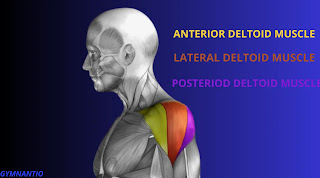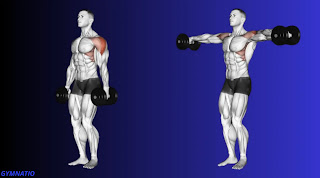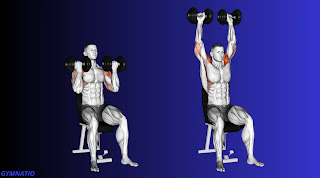%20(1)%20(1).webp) |
You must be a bit frustrated with your body shape, and you have been going to the gym for a month or two or three, but to no avail. That harmonious body shaped in the form of a (v) has been a dream that haunts you throughout this period. Well, this is exactly what you want; here you will find the balm that will make your dream come true. First, I will reassure you and tell you that it only takes some time. Second, do you give your muscles enough time and focus in exercise? Especially the muscles that are difficult to target. Yes, there are stubborn muscles in our body that are difficult to target, such as the shoulder muscles, because they are delicate joints, they are considered complex muscles. For this reason, it is necessary to choose the best shoulder exercises that suit your goals. In this article, we will provide you with a guide as help from us to start a shoulder exercise routine, teaching you the basics of shoulder muscle growth anatomy, and what to look for when choosing shoulder exercises. We will also explore some important and basic exercises to practice shoulder muscle exercises correctly.
The shoulder muscles are made up of three distinct groups of muscle fibers: the anterior deltoid, the lateral deltoid, and the posterior deltoid:
the anterior deltoid :
The anterior deltoid originates from the outer part of your collarbone and inserts into the front of your upper arm bone (humerus). Its function is to push your arm forward, such as in a press or forward lift.
The lateral deltoid :
The lateral deltoid originates from the scapula, which forms the "roof" of your shoulder joint, and inserts into the outer part of your upper arm bone. Its function is to raise your arm sideways (abduct) and hold your shoulder joint in place when you lift or carry objects.
The posterior deltoid :
The posterior deltoid originates from the back of your shoulder blade and partially covers your rotator cuff. Its function is to bring your arm back and externally rotate it.
_ Seated dumbbell shoulder press
_ Dumbbell lateral raise
_ Arnold press
_ Cable face pull.
Anatomy of shoulder muscle growth
the anterior deltoid :
The anterior deltoid originates from the outer part of your collarbone and inserts into the front of your upper arm bone (humerus). Its function is to push your arm forward, such as in a press or forward lift.
The lateral deltoid :
The lateral deltoid originates from the scapula, which forms the "roof" of your shoulder joint, and inserts into the outer part of your upper arm bone. Its function is to raise your arm sideways (abduct) and hold your shoulder joint in place when you lift or carry objects.
The posterior deltoid :
The posterior deltoid originates from the back of your shoulder blade and partially covers your rotator cuff. Its function is to bring your arm back and externally rotate it.
The importance of warming up the muscles before exercises
Okay, let's be honest, many of us skip this important warm-up, whether it's for the upper body or the legs. But for your shoulder, taking the time to warm it up is a must. This will protect it from injury, improve your exercise performance, and keep your blood flowing and the flexibility of the shoulder joint and surrounding muscles and tendons. The shoulder is a complex structure, and it relies heavily on the surrounding muscles and tendons for stability, says Florence Penney, physiotherapist and founder of " Flow Physio London. " This dynamic stability allows it a wide range of movement, but also makes it more susceptible to injuries such as dislocations, strains and impacts.Top 4 basic shoulder exercises for beginners
If you are a beginner in bodybuilding, you will need to start with simpler exercises and lighter weights in the gym. Always remember that to get the most benefit, it is necessary to train with lighter weights because you are a bodybuilder and not a weightlifter. There are many examples of shoulder exercises that you can choose from, but not all of them are suitable for beginners. In this article, we will present to you 4 effective and basic exercises:_ Seated dumbbell shoulder press
_ Dumbbell lateral raise
_ Arnold press
_ Cable face pull.
Seated Dumbbell shoulder press:
( 3sets 8-10 reps )
Your seat should be at a 90-degree angle, choose a lighter weight, pick up the dumbbells from the floor using a neutral grip (palms facing inward), place the ends of the dumbbells on your knees, and sit on the seat. Using a safe and controlled movement, raise your knees one by one in order to place the dumbbells in place ; and rotate your palms so that they face forward, then press the dumbbells above your head by extending your elbows and contracting the deltoid muscles. The arms should be at a 90-degree angle or slightly less. Repeat for the required number of repetitions.
Dumbbell lateral raise:
(3 sets 8-10 reps )
Stand holding a dumbbell in each hand, with your feet shoulder-width apart. Raise the dumbbells to your sides with your elbows slightly bent, and raise them until your arms are parallel to the floor, and make sure your elbows are higher than your fists because you are lifting the weight with your elbows. Keep your back straight and your torso stable. Finally, slowly lower the dumbbells to the starting position. Repeat for the desired number of reps.
Arnold Press:
(3 sets 8-10 reps )
Take a bench at a 90-degree angle. Pick up the dumbbells using a neutral grip (palms facing in). Place each dumbbell in place after raising your knees one by one because this movement is safe for back injuries. Rotate your palms so that they face you. Then press the dumbbells above your head by extending your elbows and contracting your deltoids. Rotate the dumbbells until your palms are facing forward. Slowly lower the dumbbells to the starting position. Repeat for the desired number of reps.
Cable Face Pull :
(3sets 10-12 reps )
Place the cable slightly above your head and hold the rope with your thumbs facing you. Stand straight with your feet slightly bent and your toes pointing forward. Engage your abs. Pull the cable toward your face by bending your elbows to the side, trying to push your fists close to your ears. Hold for a few seconds, then return to the starting position. Repeat for the desired number of repetitions.





